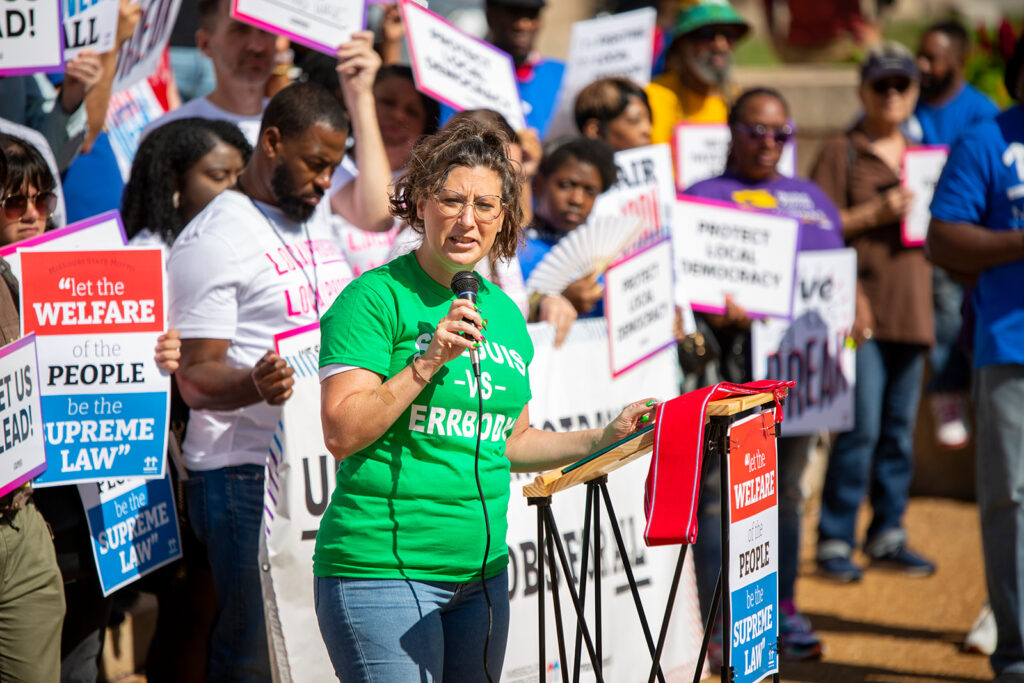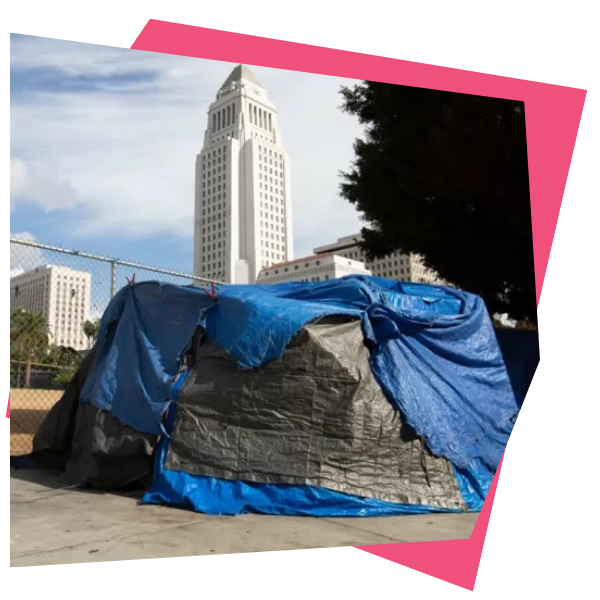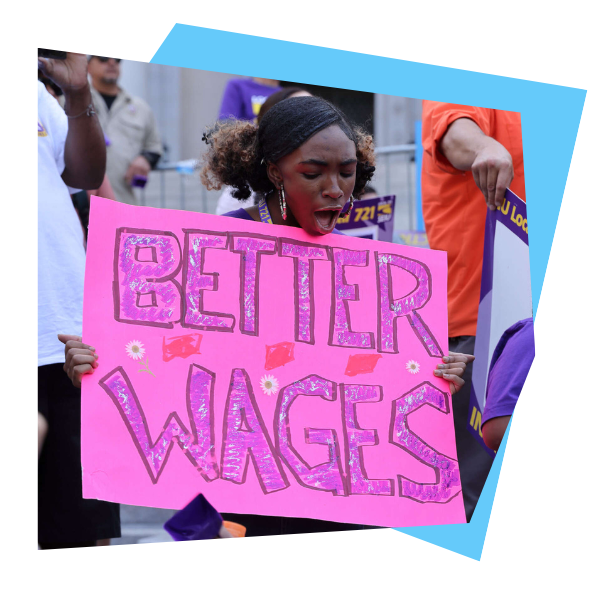Here’s a look back and look forward at some of what’s happening around the network.
“Let Us Lead!”: Localities Continue Fighting for Local Democracy
In the midst of nationwide attacks on local democracy, localities in Texas and Missouri made important inroads this past month to protect local control. In Missouri, St. Louis Board of Aldermen President Megan Green – joined by hundreds of low-wage Missouri workers from Missouri Workers Center and LP members from across the country – announced eight new ordinances in a push to win back the local freedom to act in the best interest of Missourians. These types of protections have been banned in recent years by sweeping corporate-backed state preemption laws. These ordinances would automatically take effect when Missouri state lawmakers prioritize people over corporate interests and overturn preemption. In Texas, after months of local advocacy against the Death Star law – the sweeping preemption law – it was ruled unconstitutional. This win represents, as LPTX said in a statement with local partners, “the power of our localities, our local elected officials, and the communities they represent.” As expected, the state of Texas filed for an appeal, so local Texas communities will continue to fight back against this harmful law. San Antonio City Councilmember Teri Castiilo said it best: “When you get right down to it, this law is anti-democratic. It takes the power and freedom away from everyday Texans who deserve to have their voices heard. And it directly contradicts the values that I know Texans hold true.” Read more →
Localities Are Demonstrating What Housing Justice Looks Like
Housing policies rooted in equity must be preventative, not just reactionary. That’s why localities nationwide are investing in displacement prevention and supportive housing. This summer, the City of Detroit announced the establishment of a new city office that helps Detroiters facing displacement from housing emergencies get connected to stable housing – funded in large part by APRA funds. Detroit City Councilmember Gabriela Santiago-Romero played a key role in the establishment of this important new office. In Texas, the Austin City Council allocated funding for the next three years of their successful displacement prevention program, Project Connect, spearheaded by Austin City Councilmember Vanessa Fuentes. In Louisville, KY, the proposed Historically Black Neighborhood ordinance, would curb gentrification and keep low-income people from being displaced by blocking the Louisville government from providing any resources — including money, land, or staff support — to development projects unless those projects can prove that they will be creating truly affordable housing. If passed, this would be the first of its kind and would likely serve as an example for other localities to follow suit. In addition to preventing displacement, cities must also address the needs of those currently experiencing housing insecurity. Denver recently launched its first supportive housing program to be tied to city housing vouchers. The program will have on-site childcare, moving assistance, case management, and legal services and health services. Former Councilmember Robin Kniech sponsored the ballot measure that led to the creation of this program. In Texas, Harris County recently approved a permanent supportive housing program under the leadership of Judge Lina Hidalgo and Commissioner Rodney Ellis, among others. In addition to affordable housing units, the permanent housing project will have case managers, peer specialists, service specialists, and support services, like transportation, mental health, physical and behavioral health support. Read more →
Localities using ARPA FRF to Erase Residents’ Medical Debt
The American Rescue Plan’s Federal Fiscal Relief Funds (FRF) give localities the unique opportunity to make critical investments in their communities that they may not otherwise have been able to afford. And the flexibility of these funds allows local electeds to ensure they’re being used to advance equity and racial justice. A number of localities have chosen to use their FRF to erase residents’ crushing medical debt – particularly for those who need the relief the most. Milwaukee, WI County Board approved designating $1.6 million in ARPA funds to a new partnership between the county and national nonprofit RIP Medical Debt, which will cover the costs of $153 million in medical debt. The item – which was co-sponsored by LP members Chairwoman Marcelia Nicholson and Supervisors Ryan Clancy and Steven Shea – targets low-income Milwaukee residents for the debt relief. Cook County, IL followed suit – partnering with RIP Medical Debt to eliminate medical debt for nearly 73,000 residents. Cook County Board President Toni Preckwinkle spearheaded the partnership, which will continue to eliminate medical debt. And in St. Paul, Minnesota, Mayor Melvin Carter recently proposed a budget plan that includes robust medical debt relief. Read more →
In an effort to target investments for equity, localities explore bold reparations plans
Last month, Los Angeles began their systematic reparations plan to transfer public land to marginalized communities. The motion was originally written by former Councilmember Mike Bonin, and was carried through the current council by Councilmembers Nithya Raman and Marqueece Harris-Dawson. This summer, Baltimore became the first community in the state of Maryland to start formally creating a process for reparations. The legislation, which was introduced by LP Board Co-Chair and Councilmember Kristerfer Burnett, makes recommendations to city administration with ideas on how to “repair the damage done by structurally racist and white supremacist policies” towards minority communities in Baltimore from cannabis prohibition and resulting incarceration. The New York City Council is considering an ordinance that would create a task force “to consider the impact of slavery and past injustices for African Americans in New York City and reparations for such injustices.” The ordinance is sponsored by over 20 LPNY members. Philadelphia also recently began exploring reparations. The Philadelphia City Council voted in favor of legislation introduced by Councilmembers Jamie Gauthier and Kendra Brooks to create a Reparations Task Force. Read more →
⚡️ #LP2023
To those of you who were in St. Louis and those who were there in spirit, thank you so much for being part of #LP2023.
This was our largest and most exciting national convening to date – with more than 44 different strategy meetings, workshops, and site visits, covering everything from workers’ rights and rent stabilization to reproductive justice, federal implementation, and navigating the challenges and opportunities in local governance.
More than 375 local elected officials, partners, and allies in community – sharing, healing, and learning together. Pushing each other. Empowering one another. We exchanged ideas and found inspiration. We laughed, we cried, and many of us found the clarity or the renewed energy we were looking for.
Don’t forget to check out our photo album on Facebook, our favorite hot takes on Twitter, and all our favorite moments on our brand new Instagram! Plus the full recap on our blog of some of our most powerful moments together.
👋 Meet our new LP staff!
Our LP team is growing!! This summer, we welcomed four new staff members:
💜 Tannya Benavides (she/her), Texas Chapter Manager
🩵 Kat Kerwin (she/her), Legal Fellow
❤️ Arami McCloskey (she/her), Executive Assistant
💚 Lucia Mattox (she/her), Organizing Director
Please join us in extending a warm welcome to our incredible new staff members!
💖 Introducing the Nuestro Caucus
Last month, we officially launched our newest caucus, the Nuestro Caucus – our Latinx member-led space! If you’re interested in joining, email Tannya!
🧠 Upcoming Policy & Strategy Primers
Our Policy & Strategy Primers are a series of foundational learning sessions on policy tools and strategy designed to help local electeds and staff figure out where and how to get started on key issues. The series operates on a regular, recurring schedule throughout the year focusing on issues related to housing, community safety, economic justice, and communications strategies. Next up this fall…
📈 Equitable Development on October 11
🏡 Advancing Housing Justice on November 15
📰 Media Strategies on November 29
❤️ Police Accountability and Harm Reduction on December 6
🌟 Are you a local elected in the South?
The Consumer Financial Protection Bureau has released new research on credit accessibility in Southern states that will be of interest to you! The reports highlight important regional trends and include fact sheets about each specific state.
For questions or to discuss the report findings for your state, please contact CFPB Senior Fellow Diana Standaert.
💭 Have a question for Local Progress?
The Local Progress Impact Lab works with members on policy, strategy, and communications support related to our core issue areas and other topics, by sharing our own knowledge and resources, making connections to other Local Progress members, and drawing on the issue area expertise of partners.
If you have a question for Local Progress, ask the helpdesk! Email helpdesk@localprogress.org
- Nearly 90 Percent of Young People Support Unions, Poll Finds | Truthout
- States and cities eye stronger protections for gig economy workers | Stateline
- Strained juvenile justice systems get relief from mobile behavioral health programs | Route Fifty
- On Chicago’s Northwest Side, Socialists Are Wielding Power in a Whole New Way | In These Times
- Here’s What Rural Leaders Say their Communities Need | Copper Courier
- Las Cruces rolls out city’s first publicly funded basic income program | KRWG Public Media
- Women capture all five at-large Nashville council seats and put Tennessee on notice | The Tennessean
- San Antonio council supports creating fund to help people travel for out-of-state abortions | San Antonio Current











